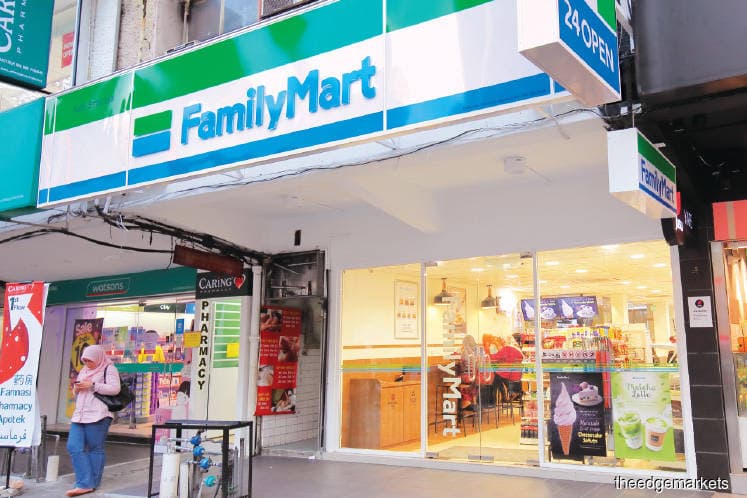
This article first appeared in The Edge Financial Daily on February 17, 2020
KUALA LUMPUR: Shares in QL Resources Bhd closed at an all-time high of RM8.45 last Friday, and observers of the agro-food company and master franchisee of the FamilyMart chain of convenience stores in Malaysia say QL has to continue delivering strong earnings growth to live up to its pricey valuation.
Its present share price has already surpassed the 12-month consensus target price (TP) of RM7.52 for the stock — based on Bloomberg data — by 12.37%.
The stock has climbed 25.07% in the past year, adding RM2.56 billion to its market capitalisation, which now stands at RM13.71 billion.
A fund manager, who spoke on the condition of anonymity, said QL is expensive from a valuation perspective, given its high price-earnings ratio (PER) and low dividend yield. Bloomberg data shows QL’s PER stands at 58.94 times, with its dividend yield at 0.53%.
“If they can register double-digit year-on-year (y-o-y) profit growth of 15% to 20% in the third quarter ended Dec 31, 2019 (3QFY20), it will be enough to justify their valuation, as it shows they can deliver three consecutive quarters of double-digit earnings growth,” he told The Edge Financial Daily.
Some investors are buying the stock on the possibility that QL would spin off the subsidiary that houses its FamilyMart franchise business for listing, the fund manager said. If QL chooses to do so, it could fuel further growth for the convenience store chain in Malaysia, he added, which has been popular due to its ready-to-eat products that are increasingly popular among Malaysians.
Besides, the stock is deemed as a safe counter under current market conditions due to its earnings stability, the fund manager said.
Likewise, BIMB Securities Research analyst Noorhayati Maamor noted that QL is one of the rare counters that have not been affected by uncertainties hitting the market in the past.
“QL is one of the rare few that we think have not been affected by global vagaries over the years, as its earnings growth went uninterrupted despite the advent of the Asian financial crisis, SARS (severe acute respiratory syndrome), H1NI (swine flu) and the subprime crisis. We believe its current earnings prospect will remain intact, given the inelastic demand for basic food products such as eggs, frozen fish, prawns and surimi-based products,” she said.
And its earnings growth momentum is set to continue, albeit at a slower rate in its fourth quarter ending March 31, 2020 (4QFY20) due to slower consumer sentiment amid the Covid-19 outbreak. Thereafter the momentum should normalise as its business of producing staple-based food is sustainable and generally recession-proof, Noorhayati added.
In fact, she opined that export demand for QL’s marine products will rise as the ongoing viral outbreak will encourage the restocking of frozen food.
For the six months ended Sept 30, 2019 (6MFY20), QL’s net profit grew 15.18% to RM120.23 million from RM104.38 million in the same period a year ago, as revenue rose 18.97% to RM2.07 billion from RM1.74 billion.
FamilyMart’s maiden contribution, stronger CPO price to boost growth
In a note to investors last week, Kenanga Research said QL is on track to meet its FY22 target of 300 store locations for its FamilyMart business. It has already exceeded its targeted 170 outlets by FY20 — with some 176 stores to date. AffinHwang Capital, meanwhile, expects FamilyMart to post its maiden earnings contribution to QL this financial year, with its convenience store business set to contribute RM24 million pre-tax profit for FY20, RM42 million for FY21, and RM77 million for FY22.
“With increasing presence in the Klang Valley, Johor, Melaka, Pahang and Negeri Sembilan, the group will continue branching out with potential openings in Ipoh and Penang. We gathered that decent food traffic in these areas tends to fare higher average revenue per store from the added convenience. In the longer term, we believe this segment will be an exciting avenue of growth for the group, banking on its high fresh food content which we believe takes up around 80% of its sales,” Kenanga Research said in the Feb 12 note.
It also upgraded QL to “market perform” and increased its target price for QL to RM8.30 from RM6.60. “Our valuation is based on higher earnings estimates in addition with a higher 50x (times) FY21E PER (from 42x)... While valuation appears rich at this level, we believe it is fair, premised on its resilient earnings base and rosy earnings growth expectations of around 10%-13%, overwhelming pedestrian dividend yield of around 1%. Comparatively, other large (capitalisation) F&Bs (food and beverage companies) are expected to demonstrate only around 8% earnings growth on average,” it noted.
Both Kenanga Research and AffinHwang Capital also noted that higher crude palm oil (CPO) prices will be good for QL, whose palm oil activities (POA) contribute 6% of the group’s total 6MFY20 revenue.
QL has 16,200ha in Sabah and Sarawak, of which 1,200ha are planted, and another 10,000ha planted tract in East Kalimantan, Indonesia, according to AffinHwang capital.
“Since October 2019, CPO prices have been on an uptrend, reaching a peak of RM3,100/tonne in early January 2020 on the back of the anticipated higher demand growth rate for palm oil products compared to production. Consequently, we lift our CPO average selling price assumption to RM2,500-RM2,600/tonne for FY21/22E from RM2,300-RM2,400 previously. Moving forward, FFB (fresh fruit bunch) production is also expected to rise on the increasing maturity profile of its plantation in Eastern Kalimantan, Indonesia,” AffinHwang Capital noted in its Feb 12 note, when it kept its “buy” call on QL, with a higher TP of RM9.30 from RM8.50 previously.